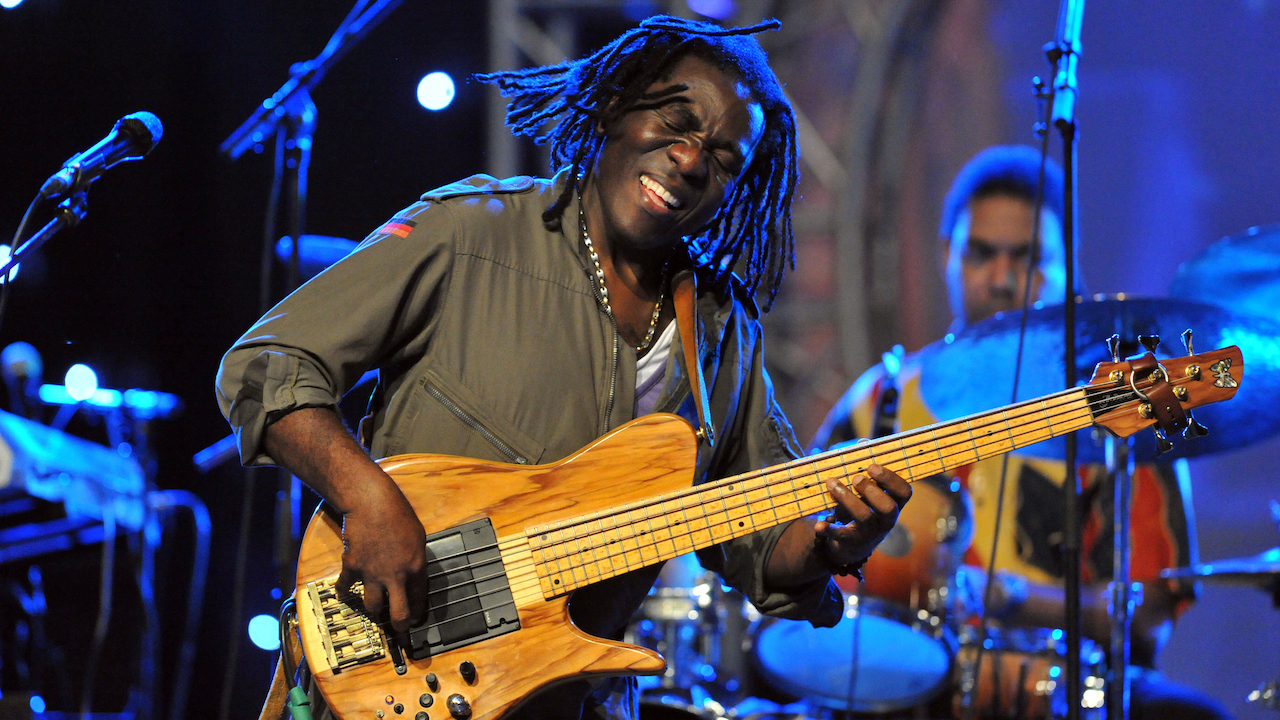“Sometimes the simplest bassline is the most difficult to play!” How Richard Bona developed his percussive right-hand technique
Richard Bona may have the chops to pull off superhuman solos, but his strengths as a sideman lay in keeping things simple

Richard Bona’s staggering talent on the bass guitar has seen him emerge as one of the instrument’s most identifiable players since Jaco. With equal facility on fretted and fretless instruments, Bona delivers improvised lines with astonishing speed and fluidity, while holding down percussive right-hand grooves using a muting technique he developed playing balafon as a child in Cameroon.
“As a kid I was a percussion player so I grew up surrounded by different grooves,” he told BP. “So I use muted notes a lot and I like to tap the strings with my fingers and come in and out of different tonalities. I just love grooving!”
Such vivid musicianship has been evident throughout his career, with Bona adding rhythmic interest to even the simplest of basslines. “I like to play simple basslines, but sometimes the simplest line is actually the most difficult thing to play; in music, in general, I think the simple things are actually very difficult, just to be able to groove and groove hard.”
Onto Bona’s sonic arsenal: it would seem that simplicity rules these days. “I always let my fingers take care of my tone. I can make the sound rounder or make the sound bigger, depending where I attack the string, and I move around from pickup to pickup, so if I’m playing a ballad I usually play on the neck pickup, but if it’s a fast tune with a lot of energy I like to play with more staccato so I will play on the bridge pickup.”
Having sung from an early age, Bona has also developed an innate understanding of melody. “When you look at Cuban musicians, there might be 16 guys on stage and 14 of them will be singing! You know? When you look at The Beatles or any of the English rock bands from the 60s and 70s, they all used to sing! But we don’t teach people how to sing anymore. It’s not about having a pretty voice; it’s just that when you sing, music penetrates your body in a different kind of way. I always tell bass players to sing when they play.”
“It’s the same with improvisation. I don’t want to have to learn solo lines, I just want to feel the moment and then play whatever comes to me, because that’s the thing with any instrument I play – bass, guitar, whatever, I want to just follow the music that’s in my mind, so anything I can sing I can play. My fingers just follow what I come up with in my head and that all comes from singing.”
Taken from Bona’s 2013 solo album, Bonafied, the song Tumba La Nyama centres on a looped vocal theme and showcases Bona’s falsetto singing voice, along with his intrinsic understanding of harmony. “I hear a lot of different tones at the same time when I sing. I can record background vocals alone, but it won’t sound like one person doing it. My mother conducted a choir in church, so I grew up singing and I like to try and simulate what I used to hear when I was a kid. I don’t write charts. The only music I read is when I play with other people; I just go and feel the notes, feel the harmony and build up different vocal layers.”
Get The Pick Newsletter
All the latest guitar news, interviews, lessons, reviews, deals and more, direct to your inbox!
It only takes one listen to Bonafied, or indeed, any of Richard Bona’s mesmerisingly rounded solo work over the last 20-odd years, and you’ll know exactly what he means. “When you hear me play the bass you can hear that I sing, that I’ve played percussion for many years and that I play guitar too, so it’s a combination of all those things. The balafon I was playing as a kid, I can still hear in my bass playing today.”

Nick Wells was the Editor of Bass Guitar magazine from 2009 to 2011, before making strides into the world of Artist Relations with Sheldon Dingwall and Dingwall Guitars. He's also the producer of bass-centric documentaries, Walking the Changes and Beneath the Bassline, as well as Production Manager and Artist Liaison for ScottsBassLessons. In his free time, you'll find him jumping around his bedroom to Kool & The Gang while hammering the life out of his P-Bass.
“I asked him to get me four bass strings because I only had a $29 guitar from Sears”: Bootsy Collins is one of the all-time bass greats, but he started out on guitar. Here’s the sole reason why he switched
“I got that bass for $50 off this coke dealer. I don’t know what Jaco did to it, but he totally messed up the insides!” How Cro-Mags’ Harley Flanagan went from buying a Jaco Pastorius bass on the street to fronting one of hardcore’s most influential bands

![John Mayer and Bob Weir [left] of Dead & Company photographed against a grey background. Mayer wears a blue overshirt and has his signature Silver Sky on his shoulder. Weir wears grey and a bolo tie.](https://cdn.mos.cms.futurecdn.net/C6niSAybzVCHoYcpJ8ZZgE.jpg)

![A black-and-white action shot of Sergeant Thunderhoof perform live: [from left] Mark Sayer, Dan Flitcroft, Jim Camp and Josh Gallop](https://cdn.mos.cms.futurecdn.net/am3UhJbsxAE239XRRZ8zC8.jpg)






